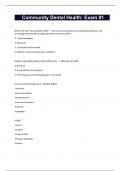-
1. Exam (elaborations) - Ardms abdomen board review questions and answers with solutions 2024
-
2. Exam (elaborations) - Ardms spi exam questions and answers with solutions 2024
-
3. Exam (elaborations) - Abdomen ardms _ mock exam questions and answers with solutions 2024
-
4. Exam (elaborations) - Ardms exam prep questions and answers with solutions 2024
-
5. Exam (elaborations) - Rvt ardms exam review questions and answers with solutions 2024
-
6. Exam (elaborations) - Ardms breast exam questions and answers with solutions 2024
-
7. Exam (elaborations) - Ob/gyn ardms registry review questions and answers with solutions 2024
-
8. Exam (elaborations) - Vascular ardms questions and answers with solutions 2024
-
9. Exam (elaborations) - Ardms echo practice test questions and answers with solutions 2024
-
10. Exam (elaborations) - Ob/gyn ardms practice questions and answers with solutions 2024
-
11. Exam (elaborations) - Ardms practice exam questions and answers with solutions 2024
-
12. Exam (elaborations) - Ardms abd questions and answers with solutions 2024
-
13. Exam (elaborations) - Ardms practice abdomen questions and answers with solutions 2024
-
14. Exam (elaborations) - Preparation for abdomen ardms exam questions and answers with solutions 2024
-
15. Exam (elaborations) - Ardms ae questions and answers with solutions 2024
-
16. Exam (elaborations) - Ardms abdomen exam questions and answers with solutions 2024
-
17. Exam (elaborations) - Ardms ob/gyn questions and answers with solutions 2024
-
18. Exam (elaborations) - Ardms rvt questions and answers with solutions 2024
-
19. Exam (elaborations) - Ardms abdomen ultrapass review (liver) questions and answers with solutions 2024
-
20. Exam (elaborations) - Breast boards ardms questions and answers with solutions 2024
-
21. Exam (elaborations) - Pediatric ardms review questions and answers with solutions 2024
-
22. Exam (elaborations) - Ardms liver questions and answers with solutions 2024
-
23. Exam (elaborations) - Ardms fetal echocardiography questions and answers with solutions 2024
-
24. Exam (elaborations) - Ardms obstetrics questions and answers with solutions 2024
-
25. Exam (elaborations) - Physical principles ardms exam pt 1 questions and answers with solutions 2024
-
26. Exam (elaborations) - Spi practice (ardms a & b) questions and answers with solutions 2024
-
27. Exam (elaborations) - Ardms review: abdominal vasculature questions and answers with solutions 2024
-
28. Exam (elaborations) - Ardms obgyn registry review questions and answers with solutions 2024
-
29. Exam (elaborations) - Ardms renal sonography review questions and answers with solutions 2024
-
30. Exam (elaborations) - Ardms rvt urr qa, safety & spi questions and answers with solutions 2024
-
31. Exam (elaborations) - Ardms abdomen board- lab values questions and answers with solutions 2024
-
32. Exam (elaborations) - Ardms pancreas review questions and answers with solutions 2024
-
33. Exam (elaborations) - Obgyn ardms – davies questions and answers with solutions 2024
-
34. Exam (elaborations) - Ardms abdomen exam prep: liver questions and answers with solutions 2024
-
35. Exam (elaborations) - Davies breast ardms questions and answers with solutions 2024
-
36. Exam (elaborations) - Spleen ardms questions and answers with solutions 2024
-
37. Exam (elaborations) - Pediatric ardms questions and answers with solutions 2024
-
38. Exam (elaborations) - Penny and urr review for abdomen ardms board questions and answers with solutions 202...
-
39. Exam (elaborations) - Ardms spi study guide questions and answers with solutions 2024
-
40. Exam (elaborations) - Ardms- spi questions and answers with solutions 2024
-
41. Exam (elaborations) - Ardms physics questions and answers with solutions 2024
-
42. Exam (elaborations) - Penny ardms abd protocols questions and answers with solutions 2024
-
43. Exam (elaborations) - Ardms thyroid questions and answers with solutions 2024
-
44. Exam (elaborations) - Review for abdomen ardms questions and answers with solutions 2024
-
45. Exam (elaborations) - Ardms spi 500 questions and answers with solutions 2024
-
46. Exam (elaborations) - Obgyn – ardms questions and answers with solutions 2024
-
47. Exam (elaborations) - Ob/gyn ardms practice test questions and answers with solutions 2024
-
48. Exam (elaborations) - Ardms renal system questions and answers with solutions 2024
-
49. Exam (elaborations) - Penny ardms abd patient care questions and answers with solutions 2024
-
50. Exam (elaborations) - Ardms spi study material questions and answers with solutions 2024
-
51. Exam (elaborations) - Ardms registry board prep questions and answers with solutions 2024
-
52. Exam (elaborations) - Aorta (ardms) questions and answers with solutions 2024
-
53. Exam (elaborations) - Ardms- sonography principles and instrumentation questions and answers with solutions...
-
54. Exam (elaborations) - Ardms abd review questions and answers with solutions 2024
-
55. Exam (elaborations) - Ardms obgyn davies questions and answers with solutions 2024
-
56. Exam (elaborations) - Ardms ob/gyn questions and answers with solutions 2024
-
57. Exam (elaborations) - Ultrasound board review - ardms ultrasound physics registry review questions and answ...
-
Show more



